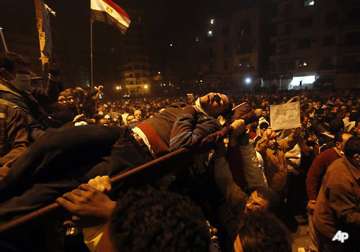As Crowds Swell In Cairo, Military In Crisis Talks
Cairo, Nov 22: A swelling crowd of tens of thousands filled Cairo's Tahrir Square Tuesday, answering the call for a million people to turn out and intensify pressure on Egypt's military leaders to hand over

Cairo, Nov 22: A swelling crowd of tens of thousands filled Cairo's Tahrir Square Tuesday, answering the call for a million people to turn out and intensify pressure on Egypt's military leaders to hand over power to a civilian government. The ruling military council held crisis talks with political parties across the spectrum to try to defuse growing cries for a “second revolution.”
The military head of state, Field Marshal Hussein Tantawi, was expected to address the nation imminently as protests in Cairo and other major cities carried on for a fourth day. Security forces stayed out of Tahrir itself to lower the temperature. But there were clashes on side streets leading to the square that was the epicenter of the uprising that ousted longtime authoritarian leader Hosni Mubarak in February.
The new wave of protests and violence around the country has left 29 dead and has thrown Egypt's politics into chaos less than a week before landmark parliamentary elections were to begin. Further confusing the situation, the military-backed civilian government on Monday submitted a mass resignation in response to the turmoil.
In a sign it was struggling over how to respond to the fast-changing events, the Supreme Council of the Armed Forces—the military body that rules the country—still had not responded to the resignation offer by Tuesday. The council's generals met Tuesday with leaders of all the various political factions, apparently trying to find a replacement government.
But the military has been backed into a difficult corner. Protesters are demanding it surrender the reins of power—or at least set a firm date in the very near future for doing so soon. Without that, few civilian political leaders are likely to join a new government for fear of being tainted as facades for the generals, as many consider the current Cabinet.
The office of leading pro-reform activist Mohamad ElBaradei said the Nobel Peace Laureate did not attend the crisis meeting but was in touch with the military. ElBaradei, the office said, prefers to continue to act as the link between the military council and the protesters until the crisis is resolved.
ElBaradei's name has been mentioned by protesters as a suitable replacement for Prime Minister Essam Sharaf, who has come under intense criticism for the perceived inefficiency of his civilian government and for being beholden to the ruling generals.
Three American students at the American University of Cairo, which sits on Tahrir Square, were arrested outside the university's campus Monday night, the AUC said.
University spokeswoman Rehab Saad told The Associated Press the three are on a study abroad program and the university is in touch with their families and the U.S. Embassy over the matter.
An Egyptian Interior Ministry official said the three were arrested while on the roof of one of the university's buildings throwing firebombs at security forces who were fighting protesters in Tahrir Square.
The official spoke on condition of anonymity because there was no authorization to speak to the media. State television showed brief footage of the three students, males who appeared to be in their early 20s.